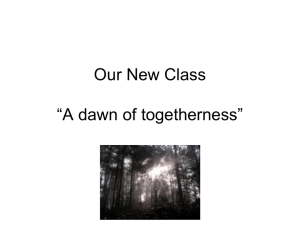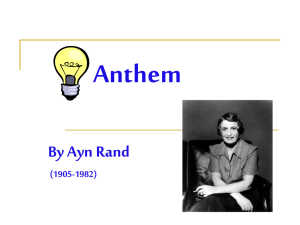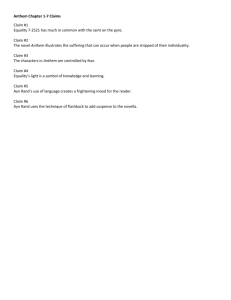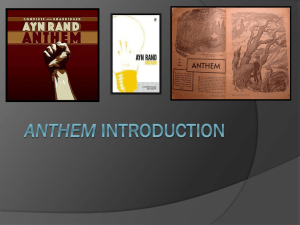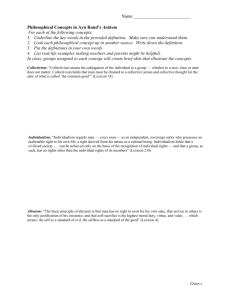Important Concepts
advertisement
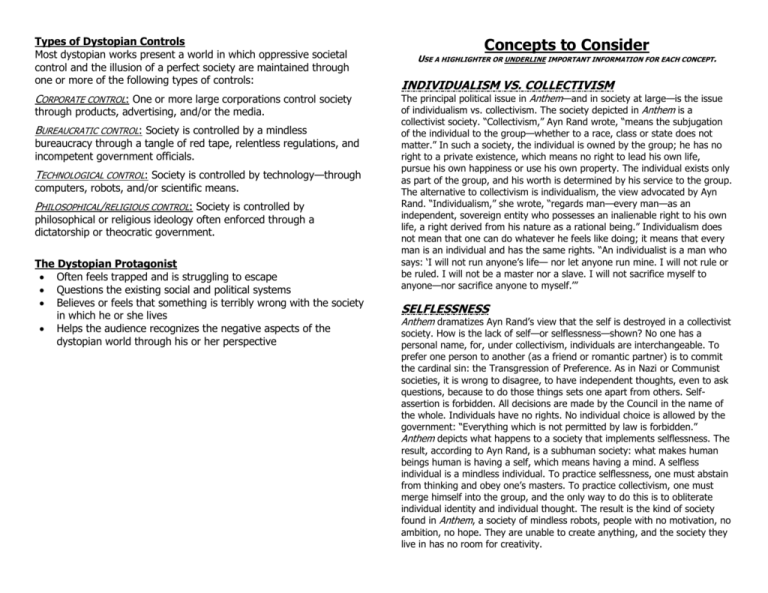
Types of Dystopian Controls Most dystopian works present a world in which oppressive societal control and the illusion of a perfect society are maintained through one or more of the following types of controls: CORPORATE CONTROL: One or more large corporations control society through products, advertising, and/or the media. BUREAUCRATIC CONTROL: Society is controlled by a mindless bureaucracy through a tangle of red tape, relentless regulations, and incompetent government officials. TECHNOLOGICAL CONTROL: Society is controlled by technology—through computers, robots, and/or scientific means. PHILOSOPHICAL/RELIGIOUS CONTROL: Society is controlled by philosophical or religious ideology often enforced through a dictatorship or theocratic government. The Dystopian Protagonist Often feels trapped and is struggling to escape Questions the existing social and political systems Believes or feels that something is terribly wrong with the society in which he or she lives Helps the audience recognizes the negative aspects of the dystopian world through his or her perspective Concepts to Consider USE A HIGHLIGHTER OR UNDERLINE IMPORTANT INFORMATION FOR EACH CONCEPT. INDIVIDUALISM VS. COLLECTIVISM The principal political issue in Anthem—and in society at large—is the issue of individualism vs. collectivism. The society depicted in Anthem is a collectivist society. “Collectivism,” Ayn Rand wrote, “means the subjugation of the individual to the group—whether to a race, class or state does not matter.” In such a society, the individual is owned by the group; he has no right to a private existence, which means no right to lead his own life, pursue his own happiness or use his own property. The individual exists only as part of the group, and his worth is determined by his service to the group. The alternative to collectivism is individualism, the view advocated by Ayn Rand. “Individualism,” she wrote, “regards man—every man—as an independent, sovereign entity who possesses an inalienable right to his own life, a right derived from his nature as a rational being.” Individualism does not mean that one can do whatever he feels like doing; it means that every man is an individual and has the same rights. “An individualist is a man who says: ‘I will not run anyone’s life— nor let anyone run mine. I will not rule or be ruled. I will not be a master nor a slave. I will not sacrifice myself to anyone—nor sacrifice anyone to myself.’” SELFLESSNESS Anthem dramatizes Ayn Rand’s view that the self is destroyed in a collectivist society. How is the lack of self—or selflessness—shown? No one has a personal name, for, under collectivism, individuals are interchangeable. To prefer one person to another (as a friend or romantic partner) is to commit the cardinal sin: the Transgression of Preference. As in Nazi or Communist societies, it is wrong to disagree, to have independent thoughts, even to ask questions, because to do those things sets one apart from others. Selfassertion is forbidden. All decisions are made by the Council in the name of the whole. Individuals have no rights. No individual choice is allowed by the government: “Everything which is not permitted by law is forbidden.” Anthem depicts what happens to a society that implements selflessness. The result, according to Ayn Rand, is a subhuman society: what makes human beings human is having a self, which means having a mind. A selfless individual is a mindless individual. To practice selflessness, one must abstain from thinking and obey one’s masters. To practice collectivism, one must merge himself into the group, and the only way to do this is to obliterate individual identity and individual thought. The result is the kind of society found in Anthem, a society of mindless robots, people with no motivation, no ambition, no hope. They are unable to create anything, and the society they live in has no room for creativity. EGOISM If lacking an ego means that one has become a robot, what, for Ayn Rand, is the exact meaning of egoism? Egoism means “concern with one’s own interests.” It means that oneself, rather than others, is the proper beneficiary of one’s action. Equality 7-2521 is egoistic. He lives for his own happiness; he doesn’t sacrifice himself to others, nor does he sacrifice others to himself. The egoism he manifests is exactly what the leaders try to eradicate: ambition, wanting things for oneself, wanting to learn, wanting a career that makes him happy, loving someone, thinking for himself. Equality 7-2521 represents the unconquerable human spirit, the affirmation of life. In contrast, almost all of his fellow citizens are gray, passive, non-entities; as such, they are the living dead. Chapter 11 ends with “This one god, this one word: ‘I,’” and the final words of the book refer to the “sacred word: EGO.” Does this mean that egoism is a religion, with the worship of God replaced by the worship of self? No. Ayn Rand has said that she chose the title Anthem “because this is my hymn to man’s ego.” For Ayn Rand, the self is like a god, but is not a god in the religious sense. The ego or self is a “god” in that it is one’s highest value, the source of what is good in life on Earth. FREE WILL One of the oldest and most important philosophic issues is the problem of free will vs. determinism. Those like Ayn Rand, who advocate free will, contend that people can make choices, can make up their own mind, can make decisions, can direct their own lives by the ideas and values they adopt. Those who advocate determinism contend that people are by nature in the grip of forces beyond their control, that their beliefs and values are the result of some force such as God, other people, the stars, economic conditions, instincts or one’s racial heritage. Anthem shows what it means to have free will, and it does so in a particularly interesting way. It depicts a world where people’s lives seem to be determined but it’s actually a world where people have free will. Students often believe that in Anthem only the heroic characters have free will, that the masses are indeed brainwashed, with no power to control their own lives. However, as Ayn Rand presents them, even those who submit to the authorities have free will. They are robots, but they are robots by choice: they were not forced to obey; they do so because they voluntarily abdicated the responsibility to think for themselves. They are depressed, without hope or ambition; they make no effort to accomplish anything; they merely obey and go along with orders. Ayn Rand holds that free will means “the choice to think or not.” Most of the citizens have chosen not to think, which leaves them no alternative but to do whatever they’re told to do. How is free will manifested in Anthem? Prometheus relies on his own judgment rather than take the beliefs of his leaders as automatically true. His rediscovery of electricity is the prime example of free will: he himself initiates the thinking required to understanding the world around him; this is what makes him independent. Neither he nor his friends are bound by tradition. That the past is “unmentionable” does not prevent them from mentioning it; that the forest beyond their city is “uncharted” does not prevent them from reaching it. And this is the ultimate meaning of a free-will approach to life: the future is open to man; what you attain is up to you; your values and your ultimate happiness are achievable. In Ayn Rand’s view, man has the power to think and direct his life; he isn’t doomed to a life of despair and defeat. If he is willing to rely on himself rather than be pushed by events, he can, like the heroic characters in Anthem achieve self-confidence. Dystopias: Definition and Characteristics UTOPIA: A place, state, or condition that is ideally perfect in respect of politics, laws, customs, and conditions. DYSTOPIA: A futuristic, imagined universe in which oppressive societal control and the illusion of a perfect society are maintained through corporate, bureaucratic, technological, moral, or totalitarian control. Dystopias, through an exaggerated worst-case scenario, criticize a current trend, societal norm, or political system. Characteristics of a Dystopian Society Propaganda is used to control the citizens of society. Information, independent thought, and freedom are restricted A figurehead or concept is worshipped by the citizens of the society. Citizens are perceived to be under constant surveillance. Citizens have a fear of the outside world. Citizens live in a dehumanized state. The natural world is banished and distrusted. Citizens conform to uniform expectations. Individuality and dissent are bad. The society is an illusion of a perfect utopian world.
